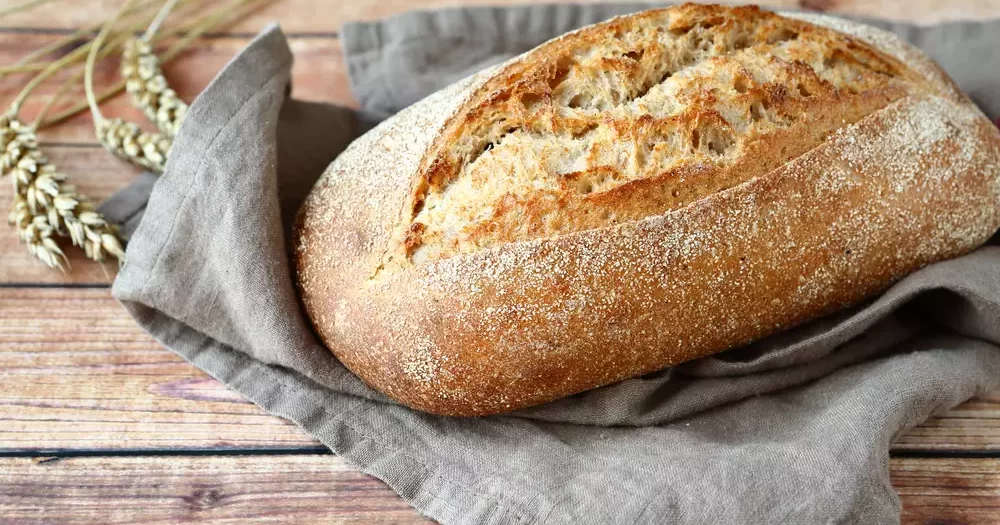Biting into a slice of store-bought bread, you might wonder why it’s so much softer than the homemade variety. The answer lies in the ingredients, the production process, and some clever food science.
In this comprehensive article, we’ll explore the factors that contribute to the pillowy texture of commercial bread and how it compares to homemade loaves.
The Role of Ingredients in Softness
Flour: The Foundation
High-Gluten Flour: Commercial bread typically uses high-gluten flour, which contains more protein and helps create a softer, more elastic dough. This results in a lighter, airier texture in the final product.
Vital Wheat Gluten: Some manufacturers add extra gluten to their dough, further enhancing elasticity and softness.
Fat: Enhancing Texture
Vegetable Oils: Oils such as soybean or canola are often used in commercial bread production. They help to create a tender crumb and extend the shelf life of the bread.
Emulsifiers: Ingredients like lecithin, mono- and diglycerides help to improve the texture of store-bought bread by promoting a finer crumb structure and a more even distribution of fat throughout the dough.
Preservatives: Extending Freshness
Calcium Propionate: This common bread preservative inhibits the growth of mold and bacteria, helping to maintain the soft texture of store-bought bread for a longer period of time.
Potassium Sorbate: Another popular preservative, potassium sorbate is used to extend the shelf life and freshness of commercial bread.

Production Techniques that Make a Difference
Mixing and Kneading: Unlocking Gluten Potential
In commercial bakeries, machines mix and knead the dough much more efficiently than can be done by hand. This allows for optimal gluten development, resulting in a softer, more elastic dough.
Fermentation: Controlled for Consistency
Store-bought bread undergoes a carefully controlled fermentation process, with specific temperatures and humidity levels designed to create the perfect environment for yeast to thrive. This results in a consistent rise and soft texture.
Dough Conditioning: Science Meets Baking
Enzymes: Commercial bread often contains enzymes like amylase and protease, which break down starches and proteins, helping to create a softer, more tender crumb.
Ascorbic Acid: Added as a dough conditioner, ascorbic acid (vitamin C) strengthens the gluten network, resulting in a lighter, airier texture.
The Chorleywood Bread Process: Revolutionizing Softness
Developed in the 1960s, the Chorleywood Bread Process (CBP) is a high-speed, energy-intensive method of bread production that allows for the creation of exceptionally soft, light-textured bread.
The CBP relies on mechanical energy and chemical additives to achieve rapid dough development and a shorter fermentation time, resulting in a distinctive softness.
The Impact of Slicing and Packaging
Precision Slicing: Consistency Matters
Commercially produced bread is sliced using machines designed for precision and consistency. This results in uniform slices that are less likely to crumble, further contributing to the perception of softness.
Packaging: Sealing in Freshness
Store-bought bread is packaged in airtight plastic bags, which help to retain moisture and maintain the soft texture of the bread for a longer period of time.
This contrasts with homemade bread, which is often stored in more breathable containers, allowing moisture to escape and potentially causing the bread to become stale more quickly.
Whole Grain vs. White Bread: A Softness Showdown
It’s important to note that the soft texture of store-bought bread is often more pronounced in white bread varieties, as opposed to whole grain options. Whole grain breads tend to be denser and chewier due to the presence of bran and germ in the flour.
However, even store-bought whole grain breads can be softer than their homemade counterparts, thanks to the ingredients and production techniques discussed earlier.
FAQs
Why is homemade bread denser than store-bought bread?
Homemade bread is often denser because it lacks the specific ingredients, equipment, and techniques used in commercial bread production to create a soft, tender crumb.
Can I make my homemade bread as soft as store-bought bread?
While it may be difficult to replicate the exact texture of commercial bread, you can make your homemade bread softer by using high-gluten flour, adding fat, and employing proper mixing, kneading, and fermentation techniques.
Is store-bought bread less healthy than homemade bread?
It depends on the ingredients used in each bread. Store-bought bread often contains added preservatives, emulsifiers, and dough conditioners that may not be present in homemade bread.
However, it is possible to find healthier store-bought options made with whole grains, minimal additives, and lower levels of sodium. Ultimately, the healthfulness of bread depends on the specific recipe and ingredients used, whether it’s homemade or store-bought.
Final Thoughts
The soft texture of store-bought bread is the result of a combination of factors, including specific ingredients, production techniques, and packaging methods.
While it may be challenging to recreate the exact softness of commercial bread at home, understanding the science behind this texture can help you to make your homemade loaves softer and more enjoyable.
So, the next time you bite into a slice of store-bought bread, you can appreciate the complex interplay of factors that contribute to its pillowy softness.

what other alternatives can I use other than chemicals or sugar 0oil to make home baked bread softer ?
Just the thought that the flour has gone through a bleaching process is enough to make me buy refined flour and I presume most stire bought bread are using this as well?)
Many thanks foor helping me make healthier bread 🙂
regards,
ana
Hi Ana, thanks for the comment.
Some natural alternatives to make home-baked bread softer without using chemicals, sugar or oil include adding milk, yogurt, mashed potatoes or potato flour, honey, or vinegar to the dough. It’s important to experiment with small batches to find the right combination that works for you.